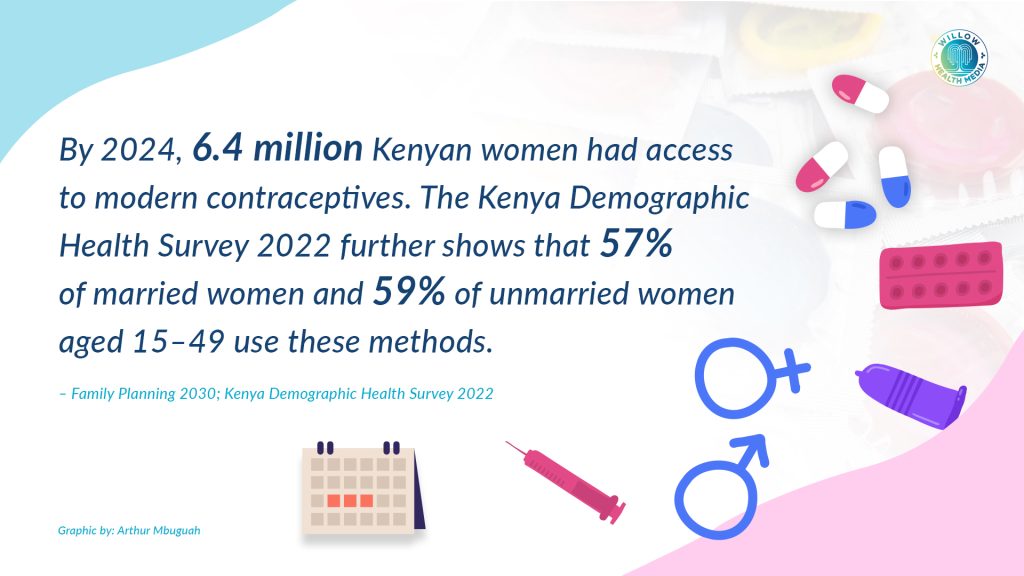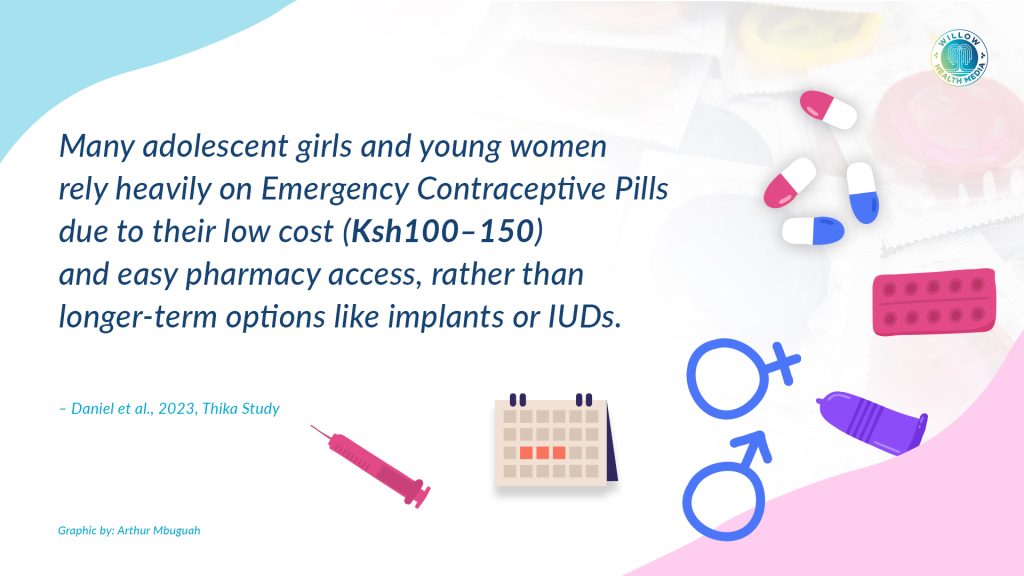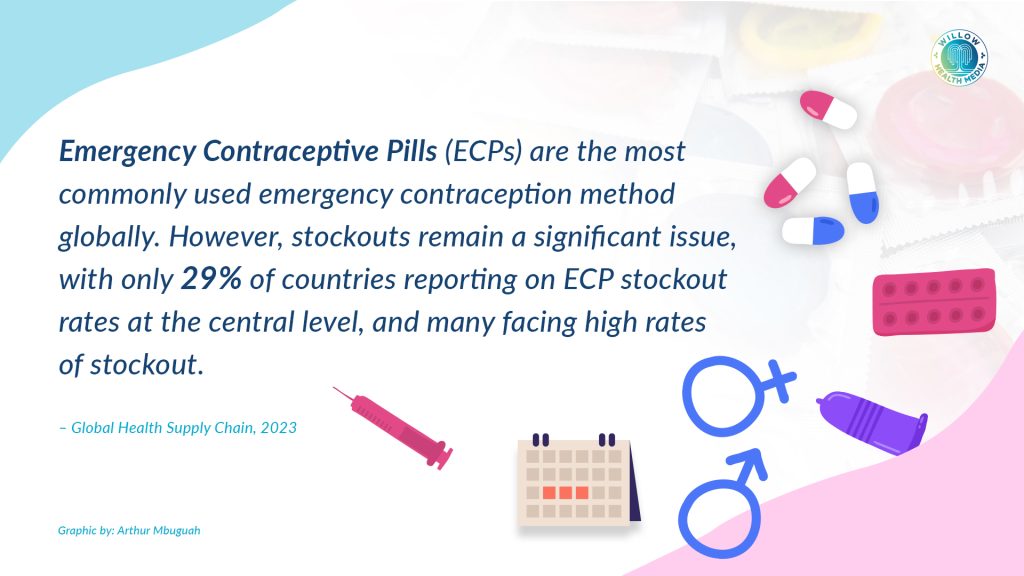Long-term misuse of Emergency Contraceptive Pills increases the risk of ovarian cysts, hormonal imbalance, mood swings, depression, blood clots and high blood pressure
When the rhythm of the River Nile guided all life, ancient Egyptians pioneered some of the first-known family planning techniques: traditional healers blended honey, lint and acacia leaves; a carefully concocted mixture, which, when inserted into a woman’s body, prevented conception, showcasing the timeless human quest for control over life’s rhythms.
These Egyptian healers intentionally selected these plants based on their understanding of their chemical properties ─ acacia leaves, for instance, contain spermicidal chemicals, which can kill or cripple a sperm, preventing it from fertilising an egg cell (ovum). This ancient wisdom, blending observation and innovation, reveals a sophisticated grasp of reproductive science long before modern medicine took shape.
In fact, it wasn’t until 1967 that the Government of Kenya launched the official family planning initiative, which has since made us among Africa’s leading countries in family planning.
Data from the Family Planning 2030 website reveal that 6.4 million Kenyan women had access to modern contraceptive methods by 2024. According to the Kenya Demographic Health Survey 2022 found that 57% of married women and 59% of unmarried women, aged 15-49, use modern contraceptive methods. These methods include: Intrauterine devices (IUDs), male and female condoms, emergency contraception, birth control pills, implants and lactational amenorrhea (using breastfeeding as a temporary method).
This, in turn, has empowered women to take control of their reproductive health by using their preferred method of contraception. This is not only a personal choice, but also a fundamental right enabling them to pursue other goals, including careers and education, without fear of unplanned pregnancies.

Emergency Contraceptive Pills (ECPs) the most misunderstood and misused contraceptives in Kenya
However, many misuse contraceptives for various reasons, oblivious to health and social consequences. This did not start the other day. By 2004-which is 20 years ago, the Daily Nation reported how contraceptive misuse had descended into an epidemic in which young Nairobi women were “eating emergency contraceptives like chocolate.”
Little has changed, as by 2022, the Agha Khan University Hospital revealed that Emergency Contraceptive Pills (ECPs) were the most misunderstood and misused contraceptives in Kenya.
In a 2023 study in Thika, Kiambu County in Kenya, Dr Afkera Daniel and fellow researchers found that many adolescent girls and young women rely heavily on ECPs to prevent pregnancy.
This is due to their convenience, low cost (Ksh100-Ksh150), and easy access at pharmacies, which eliminates the need for follow-up visits or appointments at public hospitals for longer-term options like implants or intrauterine devices (IUDs).
One participant in Dr Afkera’s study noted that some believe ECPs reduce fertility, leading many young women to prefer them over other methods. The study specifically compared ECPs to Long-Acting Reversible Contraceptives (LARCs), which are more effective for long-term pregnancy prevention.
In my pharmacy practice, I have observed that buying Emergency Contraceptive Pills (ECPs) is often done secretly, especially by young women, to avoid embarrassment or public condemnation. Some send a trusted friend or partner to avoid the disapproving stare of the pharmacist behind the chemist’s counter.

Emergency Contraceptives are mainly used after sexual assault, unprotected sex or contraceptive failure…but not as daily contraceptive pills
Many, still, shy from seeking guidance on the proper use of ECPs, leading to misuse. It cannot be ruled out that, in extreme cases, some ‘temporary’ partners may force their girlfriends to take ECPs immediately after unprotected intercourse to prevent unplanned pregnancies.
By 2020, a respondent told the Daily Nation she didn’t know how many ECPs she used in a week, as “it depends on when my boyfriend is around and because he does not like to use protection, then we opt for the pill.”
Emergency contraceptives are mostly indicated for use in cases of sexual assault (if without contraceptive coverage), unprotected sex or contraceptive failure to prevent pregnancy. However, some use them as their daily contraceptives instead of during emergencies.
The morning-after pill or postinor-2 (P2) has active pharmaceutical ingredient levonorgestrel, a synthetic form of progesterone, a naturally occurring female sex hormone. After ovulation, the ovaries produce progesterone, which inhibits the release of additional eggs and prepares the uterus for a potential pregnancy. In the case of pregnancy, progesterone levels in the body stay elevated to maintain the uterus lining.

My menstrual cycle was messed up. I got two periods in two weeks and bled for ten days
If pregnancy does not occur, progesterone levels drop, leading to a menstrual period. Levonorgestrel mimics the body’s natural processes, maintaining high levels of synthetic progesterone to trick the body into believing ovulation has already occurred. This prevents the release of eggs from the ovaries. Levonorgestrel thus prevents pregnancy by interfering with ovulation, fertilisation, and implantation of the fertilised egg into the uterus.
Postinor-2 is available as a high-dose formulation containing 1.5 mg of levonorgestrel, for the two tablets. Using these pills more than once in a single menstrual cycle can disrupt your menstrual cycle. This may in turn affect ovulation and fertility. However, some medical experts advise against using this emergency contraceptive more than twice a year.
Frequent misuse of P2 reduces its effectiveness. The body becomes unresponsive to high doses of synthetic progesterone, compromising its mechanism of action. According to a 2018 study by Dr Sahara Shurie and her colleagues at Moi Teaching and Referral Hospital (MTRH), women who misuse levonorgestrel ECPs are at increased risk of developing ectopic pregnancy, which is the implantation of the fertilised egg on the uterine tubes (in the event of contraceptive failure).
Several studies have shown that long-term misuse of these ECPs can increase the risk of ovarian cysts, hormonal imbalance, mood disturbance, depression, blood clots, and high blood pressure. These drugs are not recommended for use by women with a history of heart disease, migraines, clotting diseases, stroke, hormone-responsive cancers, liver diseases, or those who are medically obese.
Kenyan government should strengthen regulations to prevent over-the-counter misuse of Emergency Contraceptive Pills
Misuse of ECPs in Kenya remains a major issue, with minor changes in behaviour over the years. This ongoing problem highlights the need for innovative approaches and solutions to address persistent misuse.
The Kenyan government should strengthen regulations under the Pharmacy and Poisons Board Act on the sale of ECPs to prevent over-the-counter misuse. Introducing stricter measures, such as requiring a prescription for ECP purchases, could encourage medical consultations and reduce misuse.
Additionally, implementing digital tracking systems across the ECP supply chain would improve accountability and transparency. Data from these systems could help identify areas with high misuse rates, guiding targeted public education and stricter enforcement. Knowing that purchases are tracked may also discourage misuse.
Healthcare workers should educate clients about contraceptive use, promoting informed and responsible decisions about reproductive health. This can help dispel myths and misconceptions and thus empower women with accurate family planning knowledge.
Government-led public awareness campaigns can encourage the use of regular contraceptives, reducing overreliance on ECPs and correcting misconceptions about their use. Additionally, parents and schools should provide comprehensive sexual education to teenagers, addressing cultural barriers that make discussions about reproductive health difficult.
Finally, to reduce dependence on ECPs, the government should make regular contraception more affordable and accessible. This could include subsidising costs, expanding distribution to underserved areas, and partnering with NGOs and the private sector to develop innovative solutions.
In conclusion, contraceptives are a game-changer in women’s reproductive health. Beyond family planning, they may be used to manage hormonal acne, endometriosis, and polycystic ovarian syndrome (PCOS).
Dr Sharon Wambua is a pharmacist and creative non-fiction writer.
This article was first published by Willow Health Media on April 6, 2025.






















